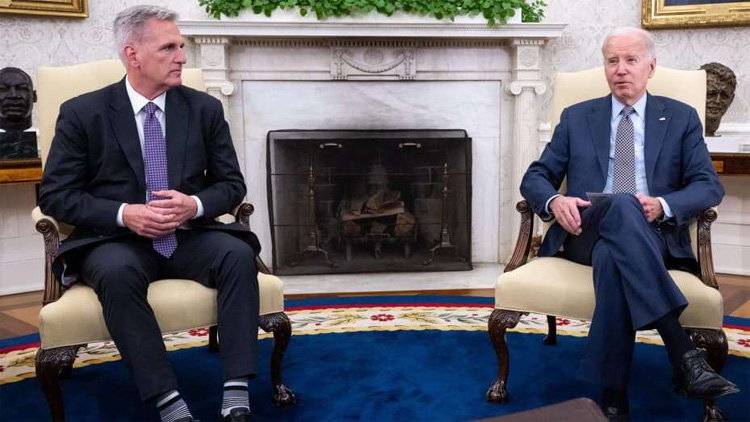Debt ceiling agreement reached between Joe Biden and Kevin McCarthy: Report
U.S. President Joe Biden and top congressional Republican Kevin McCarthy have reached a tentative deal to raise the federal government’s $31.4 trillion debt ceiling, ending a months-long stalemate, two source familiar with the negotiations said on Saturday.
The White House and negotiators for House Republicans have reached an agreement in principle to avert a debt default, two sources familiar with the situation said.
“But, I’m not sure it’s completely settled. Might be one or two small things they need to finish. But close enough to move forward,” the second source said.
Biden and McCarthy held a 90-minute phone call earlier on Saturday evening to discuss the deal.
The deal would avert an economically destabilizing default, so long as they succeed in passing it through the narrowly divided Congress before the Treasury Department runs short of money to cover all its obligations, which it warned Friday will occur if the debt ceiling is not raised by June 5.
Republicans who control the House of Representatives have pushed for steep cuts to spending and other conditions, including new work requirements on some benefit programs for low-income Americans and for funds to be stripped from the Internal Revenue Service, the U.S. tax agency.
They said they want to slow the growth of the U.S. debt, which is now roughly equal to the annual output of the country’s economy.
Exact details of the final deal were not immediately available, but negotiators have agreed to cap non-defense discretionary spending at 2023 levels for two years, in exchange for a debt ceiling increase over a similar period, sources told Reuters earlier.
The two sides have to carefully thread the needle in finding a compromise that can clear the House, with a 222-213 Republican majority, and Senate, with a 51-49 Democratic majority.
The long standoff spooked financial markets, weighing on stocks and forcing the United States to pay record-high interest rates in some bond sales. A default would take a far heavier toll, economists say, likely pushing the nation into recession, shaking the world economy and leading to a spike in unemployment.
Biden for months refused to negotiate with McCarthy over future spending cuts, demanding that lawmakers first pass a “clean” debt-ceiling increase free of other conditions, and present a 2024 budget proposal to counter his issued in March. Two-way negotiations between Biden and McCarthy began in earnest on May 16.
Democrats accused Republicans of playing a dangerous game of brinkmanship with the economy. Republicans say recent increased government spending is fueling the growth of the U.S. debt, which is now roughly equal to the annual output of the economy.
The last time the nation got this close to default was in 2011, when Washington also had a Democratic president and Senate and a Republican-led House.
Congress eventually averted default, but the economy endured heavy shocks, including the first-ever downgrade of the United States’ top-tier credit rating and a major stock sell-off.
This time around, House Speaker McCarthy had strengthened his hand by overseeing passage of an April bill that paired $4.8 trillion in spending cuts with a $1.5 trillion debt-ceiling hike. The bill had no chance of passing the Democrat-controlled Senate, but showed that McCarthy had the ability to hold together his thin majority just four months into his top leadership role.
Their work is far from done. McCarthy has vowed to give House members 72 hours to read the legislation before bringing it to the floor for a vote. That will test whether enough moderate members support the compromises in the bill to overcome opposition from both hard-right Republicans and progressive Democrats.
Then it will need to pass the Senate, where it will need at least nine Republican votes to succeed. There are multiple opportunities in each chamber along the way to slow down the process.


Comments are closed.